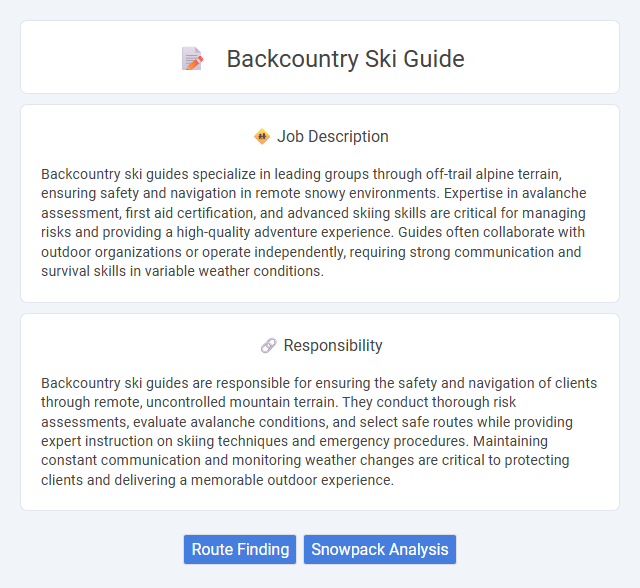
Backcountry ski guides specialize in leading groups through off-trail alpine terrain, ensuring safety and navigation in remote snowy environments. Expertise in avalanche assessment, first aid certification, and advanced skiing skills are critical for managing risks and providing a high-quality adventure experience. Guides often collaborate with outdoor organizations or operate independently, requiring strong communication and survival skills in variable weather conditions.
Individuals who possess strong physical fitness and a high level of outdoor experience are likely to be well-suited for a backcountry ski guide job, as the role demands endurance, navigation skills, and the ability to assess avalanche risks. Those with a passion for skiing and a capacity to handle high-stress situations in unpredictable environments may find this job rewarding and manageable. Conversely, people prone to physical limitations, fear of remote wilderness, or low tolerance for adverse weather conditions might face challenges in fulfilling the responsibilities effectively.
Qualification
Backcountry ski guides must possess advanced skiing skills and extensive knowledge of avalanche safety, terrain assessment, and navigation. Certification from recognized organizations such as the American Institute for Avalanche Research and Education (AIARE) or the International Mountain Leader (IML) is often required. Physical fitness, experience in wilderness first aid, and strong decision-making abilities under pressure are critical qualifications for ensuring client safety in remote mountainous environments.
Responsibility
Backcountry ski guides are responsible for ensuring the safety and navigation of clients through remote, uncontrolled mountain terrain. They conduct thorough risk assessments, evaluate avalanche conditions, and select safe routes while providing expert instruction on skiing techniques and emergency procedures. Maintaining constant communication and monitoring weather changes are critical to protecting clients and delivering a memorable outdoor experience.
Benefit
Working as a backcountry ski guide likely offers significant benefits such as access to pristine natural environments and the opportunity to develop expert knowledge in avalanche safety and mountain navigation. The role probably provides a unique chance to combine physical activity with leadership skills, fostering personal growth and resilience. Guides may also enjoy seasonal flexibility and the potential for competitive compensation, especially with specialized certifications.
Challenge
Backcountry ski guide jobs often involve navigating unpredictable terrain and rapidly changing weather conditions, which presents significant physical and mental challenges. Candidates will likely need strong decision-making skills to ensure client safety in isolated environments. The probability of encountering demanding situations requires guides to be highly adaptable and resilient.
Career Advancement
Backcountry ski guides build expertise through hands-on experience and certifications such as Avalanche Level 1 and 2, enhancing safety and technical knowledge. Progression often leads to senior guide roles, expedition leadership, or positions within ski education and mountain safety organizations. Networking with outdoor industry professionals and continuous skill development open opportunities for specialization in terrain types, rescue techniques, and client management, boosting career advancement.
Key Terms
Route Finding
Backcountry ski guides excel in advanced route finding by analyzing topographic maps, snowpack conditions, and weather patterns to select safe and efficient paths through remote mountainous terrain. They employ GPS technology and avalanche safety tools to navigate complex landscapes while minimizing risk for clients. Expertise in identifying natural hazards and optimal descent routes ensures an exceptional and secure backcountry skiing experience.
Snowpack Analysis
Backcountry ski guides specialize in conducting detailed snowpack analysis to assess avalanche risk and ensure client safety. They utilize tools such as snow pits, compression tests, and stability tests to evaluate snow layers, temperature gradients, and weak points. Mastery in snowpack assessment is crucial for making informed route decisions and managing dynamic mountain conditions effectively.
 kuljobs.com
kuljobs.com